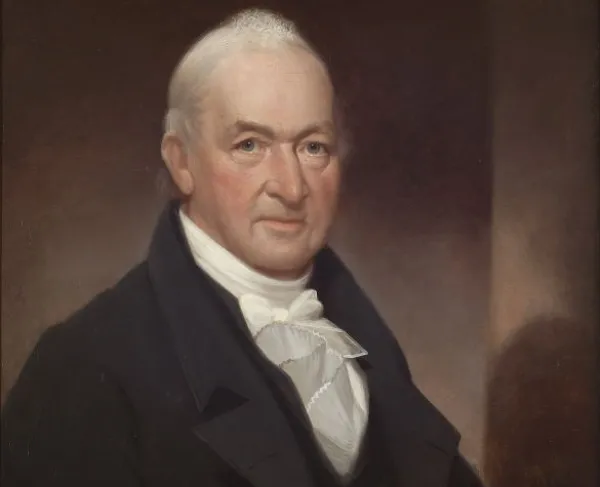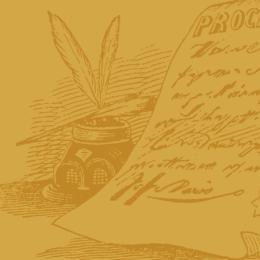Benjamin Tallmadge

One of the Revolutionary cause’s most patriotic and indispensable sons, Benjamin Tallmadge, was born February 25, 1754, in Setauket, New York, on Long Island, to Reverend Benjamin and Susannah Tallmadge. He was the second of five children. Benjamin Sr. took his son’s education very seriously, schooling him from a young age in Latin and Greek. Because of his father’s efforts, in 1769, at age fifteen, Tallmadge was enrolled at Yale. He was a classmate of future Revolutionary War spy and martyr, Nathan Hale, and successfully graduated in 1773.
Upon his graduation, he served as a schoolteacher in Wethersfield, Connecticut, until hostilities broke out between Britain and her American colonies at Lexington and Concord. "Among others,” he would later recall in life, “I caught the flame which was thus spreading from breast to breast, and mounted my horse to go and see what was going on near Boston." In 1776, he accepted a lieutenancy and appointment of regimental adjutant in a short-termed Connecticut regiment, and in his words, “…decided at once to lay aside my books (having almost determined to study law), and take up the sword in defense of my country.” In June, with Col. John Chester at the head, the regiment journeyed to join George Washington’s Continental Army and the defense of New York City.
While in New York, Tallmadge worked vigorously to prepare the men of his unit for service, training them every morning and evening along Wall Street. “He was a large, strong, and powerful man and rode a large bay horse which he took from the British,” one Connecticut soldier observed, “He was a brave officer, and there was no flinch in him. He was a man of few words, but decided and energetic, and what he said was to the purpose.” The following month, the Declaration of Independence was adopted by the Continental Congress, and “filled every one with enthusiastic zeal, as the point was now forever settled, and there was no further hope of reconciliation and dependence on the mother country.” The celebration was cut short, however, and dark clouds quickly loomed overhead after the Continental Army was driven from New York and across New Jersey by Sir William Howe. For Tallmadge, the war hit home for the first time when he learned that his older brother, William, was captured at the battle of Long Island and later died of starvation on board a British prison ship.
“It seemed as if we were on the eve of despair and ruin,” Tallmadge wrote later in life describing the defeat in New York and retreat across the Delaware River into Pennsylvania. Being now December, his enlistment was about to expire. Before that could happen, however, Tallmadge received an appointment as a captain in Col. Elisha Sheldon’s 2nd Continental Light Dragoons by Washington, himself. It was a tremendous honor for Benjamin, and he accepted, subsequently enlisting men from his own Connecticut unit to join his troop. While in Philadelphia meeting with the Board of War about raising and equipping men for his new unit, he missed the battles of Trenton and Princeton.
Tallmadge returned with his men to the Continental Army around Morristown in late spring 1777, now officially a major with a commission backdated to April. When Howe again threw his forces against Washington’s, this time aiming for Philadelphia, Major Tallmadge saw action at Brandywine and Germantown, again witnessing American defeats like around New York City. As the army went into winter encampment at Valley Forge, Tallmadge was ordered by Washington to picket the Schuylkill River with his dragoons.
It was not until the following year when Tallmadge became George Washington’s “spymaster” and opened correspondence with contacts in New York to obtain information on Henry Clinton’s British army garrisoned in the city. The espionage network eventually included Abraham Woodhull, Robert Townsend, Caleb Brewster, Anna Strong, Austin Roe, and an Agent 355. The majority of what became the “Culper Ring,” were friends of Tallmadge’s from Long Island. “Samuel Culper,” was Woodhull’s pseudonym used in correspondences to hide his identity. Tallmadge went by “John Bolton,” and served as the liaison officer between Washington and the group. Its services proved invaluable to the American cause.
In September 1780, Tallmadge found himself near the center of Benedict Arnold’s plot to surrender the strategic West Point fortifications in the Hudson Highlands to the British. Stationed at the American camp at North Castle, New York, Tallmadge swiftly acted when he learned that a man named John Anderson had been captured and brought to camp carrying signed documents by Arnold relating to West Point. The American officer in charge had sent the man back to Arnold’s headquarters near West Point, but Tallmadge, suspicious of the entire situation, was able to get him returned. Upon examination, he admitted to Tallmadge that he was in fact Major John Andre, acting adjutant general and chief intelligence officer under Henry Clinton. Andre, himself, had been serving as the liaison between Arnold and Clinton, and the documents that were uncovered on his person were given to him by the American general in preparation for the coordinated surrender of West Point.
Arnold learned of Andre’s capture before his plan could be discovered and successfully escaped to British lines. Andre, on the other hand, was not quite as lucky. Tallmadge accompanied the enemy officer to Tappan, where he would be imprisoned and await trial. During this time, Tallmadge grew to respect and admire Andre. “For the few days of intimate [conversation] I had with him…,” he remembered, “I became so deeply attached to Major Andre, that I can remember no instance where my affections were so fully absorbed in any man.” Andre was found guilty of espionage and sentenced to be hanged. On October 2, 1780, Tallmadge watched as his British counterpart met his demise: “When I saw him swirling under the gibbet, it seemed for a time as if I could not support it. All the spectators seemed to be overwhelmed by the affecting spectacle, and many were suffered in tears.”
Major Tallmadge’s service during the remainder of the war was nothing short of exceptional. Remaining with the 2nd Continental Light Dragoons, he led numerous raids from Connecticut against military targets on Long Island, most notably at Fort St. George along the southern shore, which Washington personally thanked the major for “your spirited execution of this business.” The success of the Culper Ring continued as well, and it was never uncovered by the British.
As the American and French armies besieged the British at Yorktown in September and October 1781, Tallmadge and his horsemen remained behind to observe and harass Clinton’s army still in New York City. He served in this capacity throughout the following year and remained with the army until it was disbanded in late 1783. Then, he was brevetted a lieutenant colonel.
Following the war, Tallmadge served as an original member and later president of the Connecticut branch of the Society of the Cincinnati. He married Mary Floyd in 1784, moved to Litchfield, Connecticut, and together they had seven children. She died in 1805, and several years later Tallmadge remarried. From 1800-1817, Tallmadge served in the United States House of Representatives as a Federalist.
Washington’s spymaster died on March 7, 1835, leaving behind a legacy that his son, Frederick, helped preserve in 1858, when he published his father’s memoir of his wartime experiences. In his remarks written at the conclusion of the memoir, Frederick described an emotional instance later in his father’s life: “It was a source of great pleasure to Col. Tallmadge to meet with the companions of his revolutionary struggles, and many now recollect the interesting and affectionate interview that occurred between himself and [the Marquis de] Lafayette, at New Haven, on his late visit to this country after so many years of separation. They embraced and wept at the interview when they recurred to the trying scenes through which they had passed in the ardency of youth, and that they were severally blessed by the grateful feelings of their countrymen, and the most distinguished notice of our government.”
We can save three remarkable battlefield sites if we can raise $201,500. Every dollar you can donate to this cause will be multiplied by $23.80.
Related Battles
1,300
587
1,111
533






